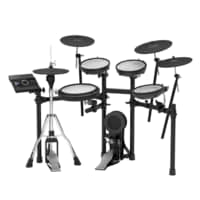Japanese electronic musical instrument maker Roland Corp. has found Malaysia to be a great fit as a market for its products, regional headquarters for Southeast Asia and a global production and distribution base.

Roland established its manufacturing facility there in 2014, according to Jun-ichi Miki, CEO of the company headquartered in Hamamatsu, Shizuoka Prefecture.
"We started with 50 employees and we now have more than 800 employees working in the Malaysian plant," Miki said in an email interview with The Japan Times. "We have expanded rapidly over the last four years of operations and the company is still growing. In the future, we plan to manufacture up to 60 percent of our all products in Malaysia."
Serving as CEO since 2013, Miki is a company veteran with 42 years of experience, 35 of which have seen him intimately involved in the development of a wide array of electronic musical instruments.
He credited help from the Malaysian Investment Development Authority (MIDA), close relationships with local suppliers and a location with advantages in logistics and production as key factors giving Roland a boost.
"We had great cooperation and support from the Malaysian government through its agency MIDA when we were first setting up the Malaysia plant," Miki said. "The Malaysian government was very pleased that an electronic musical instruments company was coming to Malaysia for the first time. MIDA was very quick and responsive to our requests. MIDA has played an important role for us. It has guided us with advice on the correct path for the smooth set up of our operation."
Miki also cites easy access to electronic and mechanical component makers and a well-maintained infrastructure as advantages for Japanese companies. This is particularly true for firms working in the technology and knowledge-based sectors.
This standard helped Roland become the first company to produce electronic musical instruments in the country, meaning procuring necessary parts was among factors that had to be overcome, according to Miki.
"In particular, changing the parts design for the unique needs of musical instruments has taken a lot of effort," he said. "We have overcome these challenges by taking a course of continued communication with parts manufacturers."
Malaysia's talented workforce, meanwhile, has been another key ingredient.
"Highly educated people with a good knowledge of the English language leads to a shorter learning curve and faster development of skills," Miki said. "Since the level of basic knowledge is high, our people can flexibly respond to various unexpected issues. There is no doubt that their continuous efforts have contributed greatly to our growth."
In terms of market, Miki said pianos and drums account for the biggest share of Roland's sales in Malaysia, with the former showing a dramatic doubling in growth in the past two years in comparison with 2016.
"The low-priced piano introduced in the series matched the available range of Malaysian households," he said. "Roland's brand and high-quality image have spread thanks to our marketing activities. The recognition of the benefits of a digital piano continues to increase."
Roland is also pleased that its products are accepted by both musical enthusiasts and professionals in Malaysia, a country known for its diversity.
"We are making great efforts to strengthen musician relations, increasing our fans in Malaysia, and as a result of these efforts, some of the hit products are born from there," he said.
Touching on broader geopolitical issues, Miki said that as Roland has a global distribution center in Malaysia, it has not seen any significant impact from the trade war between the United States and China, though he added there are concerns regarding products made in China.
Additionally, the company has yet to see any benefits from the 11-nation Comprehensive and Progressive Agreement for Trans-Pacific Partnership, or CPTPP, of which both Japan and Malaysia are members, Miki said.
"But surely it will exert a powerful impact for our business in the future," he said.
Miki cited "securing stable human resources and ensuring reliable suppliers" as the biggest future challenges in continuing to operate in Malaysia amid ongoing changes in the global economy.
And asked what advice he would offer Japanese and other foreign companies on succeeding in Malaysia, he stressed the importance of working with MIDA.
"In addition, it is better to have a flexible HR system when dealing with employee wages and welfare as job-hopping is very active in Malaysia," he said.





